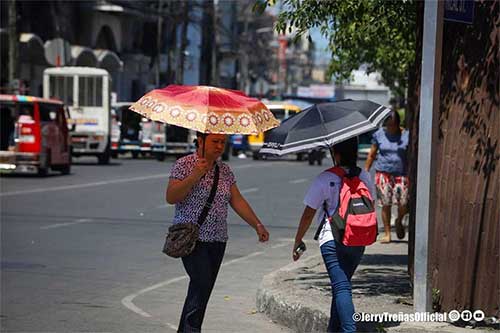
By Mariela Angella OIadive
The Department of Health Western Visayas Center for Health Development (DOH WV CHD) is urging residents to take extra precautions against extreme heat as temperatures across the region are expected to reach dangerous levels in the coming days.
In a public advisory issued on Friday, April 4, the health department cited the latest forecast from the Department of Science and Technology – Philippine Atmospheric, Geophysical and Astronomical Services Administration (DOST-PAGASA), which showed that heat indices in the region could climb between 36 to 42 degrees Celsius.
The range falls under the “Extreme Caution” category, where prolonged heat exposure and intense physical activity may lead to heat emergencies such as heat cramps, heat syncope, heat exhaustion, and heat stroke.
To minimize the risk, DOH-6 advises the public to avoid outdoor activities during peak heat hours, which typically occur between 10 a.m. and 4 p.m.
“If possible, do outdoor activities early in the morning or in the afternoon when the sun is not as strong. Stay hydrated! Drink plenty of water. Bring an umbrella or sun protection. Wear light, loose-fitting clothing, and avoid wearing dark colored clothing,” it stated.
Heat stroke, the most severe form of heat illness and a life threatening emergency, may present with symptoms such as a body temperature of 40°C or higher, dizziness, nausea, flushed and dry skin, muscle cramps, confusion, unconsciousness, and convulsions.
“Once symptoms like these occur, immediately move the affected person to a shady area and elevate the legs. Sprinkle or spray water all over the body. If the patient is able to drink liquids, encourage the person to sip cool water,” the health department advised.
It also recommended removing excess clothing, applying cold packs to the face, neck, wrists, ankles, and groin, and ensuring proper ventilation. Immediate transport to the nearest health facility is required for further medical care.
Local government units (LGUs) were also advised to ensure their communities and health facilities are ready for possible challenges, including limited water supply and intermittent electricity.
DOH-6 further called on LGUs to promote efficient water usage and energy conservation practices. It emphasized that collective action is essential to protect lives amid rising temperatures.
For urgent medical concerns or patient referrals, the public may contact the DOH Western Visayas Regional Patient Navigation and Referral Unit at 0939-988-1818.





















